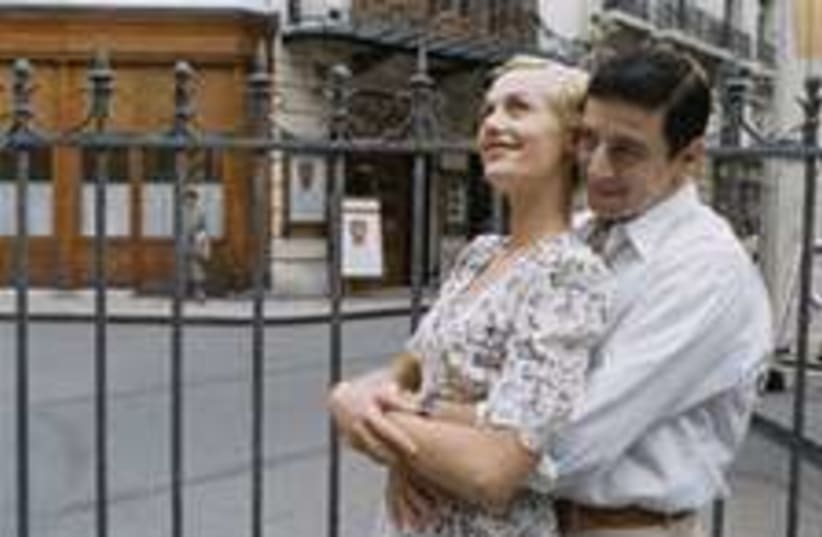A 'Secret' worth revealing
This subtle and elegant reflection on the Holocaust and its reprecussions has more impact than so many more obvious films on the subject
UN SECRET
4 stars
Directed by Claude Miller. Written by Miller and Philippe Grimbert. Hebrew title: Sod. 100 min. In French (and a little Yiddish), with Hebrew titles.
With Cecile De France, Patrick Bruel, Ludivine Sagnier, Julie Depardieu, Mathieu Amalric, Nathalie Boutefeu, Sam Garbarski
In the years that I have written about movies for The Jerusalem Post, I have seen many films with Holocaust themes, but few have moved me as much as Claude Miller's Un Secret. What makes this film work better than so many others that covered similar territory is that the characters are so vivid and that they each have an identity that goes deeper than their victimization. The movie, with a script by Miller, who adapted Philippe Grimbert's autobiographical novel (a huge bestseller in France), gives a deeper and more immediate sense than most works of fiction of how the Holocaust snuck up on so many people and interrupted (or ended) their lives. The film also takes a compelling look at how the events of these years continued to haunt families for generations. Although the bulk of the movie is concerned with the years before and after World War II, this subtle and elegant reflection on the Holocaust and its reprecussions has more impact than so many more obvious films on the subject.
Miller weaves together stories taking place in a number of different years to create a complex portrait of a family where personal and the historical pressures intersect in a uniquely painful tragedy. The film opens with a shot of Francois, a young boy who feels out of place at an upscale swim club with his parents in the late Fifties. His parents, Tania (Cecile De France) and Maxim (Patrick Buel), are a stunning, athletic couple and this skinny, pale boy who is utterly uninterested in sports clearly feels he is a disappointment to them. He finds refuge in imagining a more athletic, more charismatic brother but doesn't know where this fantasy comes from. The film moves from this period to the Eighties, when Francois (now played by Mathieu Amalric, the actor who so convincingly portrayed a stroke victim in The Diving Bell and the Butterfly that at first it was disconcerting to see him up and around here) is a therapist who also helps care for his elderly parents. When his father goes missing after his dog is run over by a car, Francois thinks back to what he learned as a teenager - still awkward and a disappointment to his parents - about their lives before the war. A family friend, Louise (Julie Depardieu), told him their story when he was in high school. From her, he discovers that although he has been raised as a Christian, they are Jews and that their true family name was Grinberg, not Grimbert. His father had a different wife, before the war, the more ordinary (but still passionate) Hannah (Ludivine Sagnier). He knew Tania, who was engaged to Hannah's brother, but their passion was kept in check by circumstances. Still, as they flee France ahead of the Nazis, just when it seems as if they will be fine, tragedy strikes, as the result either of a terrible mistake or a scornful act of will. To describe this act would be to reveal the complex mystery at the heart of Un Secret. This mystery was known to millions of French readers before they saw the film (and some English ones as well, since the book has been translated) but whether or not you know what it is, it's agonizing to see it played out on screen.
At first, some of the narrative devices feel a little too familiar, such as the inadequate son who invents the super brother, but gradually, the story draws you in. By the middle, I was so caught up in the family's drama that I forgot all about the period in which the critical scenes were set and was almost caught off guard by the beginning of the war, just as the characters were. Claude Miller, the writer/director who has made a number of memorable films, including Garde a Vue (1981), The Little Thief (1988) and La Petite Lili (2003), uses his talent for storytelling and character development to great effect here. Although it concentrates on the lives of a group of flawed characters, it's their very humanity (and their charm) that bring home the tragedy more than any depiction of idealized martyrs would.
Miller is also wonderful at directing actors and the ensemble cast performs brilliantly. The standouts are Cecile De France and Ludivine Sagnier as the two rivals at the heart of the drama. Sagnier, who so often has played bimbos or glamorous ingénues, gives a particularly surprising and wonderful performance. Her role is the trickiest, because she undergoes the most dramatic transformation, but she is credible throughout. Bruel, a pop star as well as an actor, is suitably smoldering as Maxime and Amalric gives a thoughtful performance as the adult Francois.
I've often felt that the French Jews I've known have had a story like this in their past, but it's a story that will resonate with audiences around the world. Un Secret is a gripping film.
if(catID != 151){
var cont = `Take Israel home with the new
Jerusalem Post Store
Shop now >>
`;
document.getElementById("linkPremium").innerHTML = cont;
var divWithLink = document.getElementById("premium-link");
if(divWithLink !== null && divWithLink !== 'undefined')
{
divWithLink.style.border = "solid 1px #cb0f3e";
divWithLink.style.textAlign = "center";
divWithLink.style.marginBottom = "40px";
divWithLink.style.marginTop = "40px";
divWithLink.style.width = "728px";
divWithLink.style.backgroundColor = "#3c4860";
divWithLink.style.color = "#ffffff";
}
}
(function (v, i){
});

